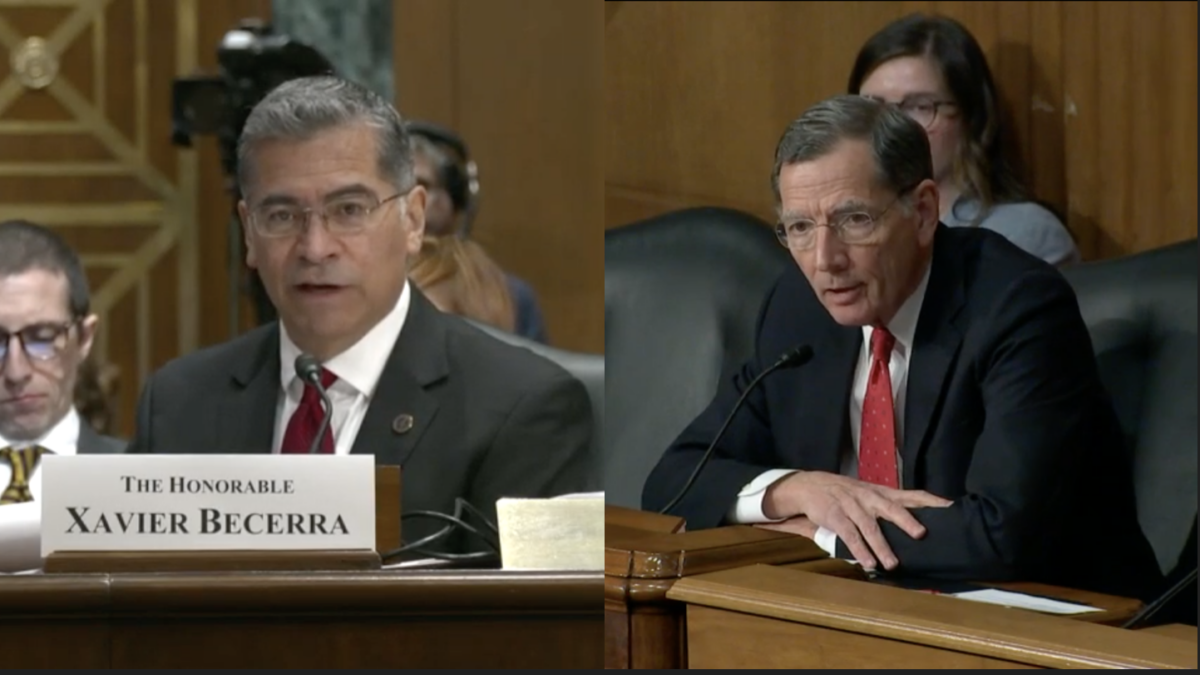
U.S. Attorney General Jeff Sessions has a strict new approach for people illegally crossing the border.
“If you are smuggling a child, then we will prosecute you and that child will be separated from you as required by law. If you don’t like that, then don’t smuggle children over our border,” Sessions stated last Monday. “We are not going to let this country be invaded. We will not be stampeded.”
Sessions unveiled a new “zero tolerance” policy regarding illegal border crossings last month, but the number of prosecutions began increasing last year. On Monday he vowed the U.S. Department of Justice would prosecute as many cases as possible “until we get to 100 percent.” No longer will illegal aliens be merely bused back across the border. Instead, in most cases they will be prosecuted. As has been widely reported, this will result in thousands of family separations, because detainees will be held in prison awaiting trial, not detention centers, and children cannot be detained in prison.
Under current law, first-time illegal entry into the United States is a misdemeanor. The zero tolerance policy is a step above the “one-strike” policy of Sessions’ April 2017 memo, which stated that only illegal aliens who enter the country after already having been sent back will be referred for felony prosecution, which carries a two-year sentence.
The DOJ will have its hands full, to say the least. DHS reports the number of “inadmissable border crossings” has tripled since last April, and the Washington Post reports that in the last month alone, border officials say they’ve found 50,000 individuals attempting entry. DOJ is adding 18 more immigration judges (a 50 percent increase) and 35 prosecutors to help.
This new policy is designed, officials told The New York Times, “to protect young children who have been abused by smugglers or drug trafficking organizations.” It’s estimated that 14,500-17,500 individuals are trafficked into the United States each year. For perspective, that constitutes about 5.7 percent of total apprehensions in 2017, though apprehensions don’t account for all border crossings.
Using Kids to Secure Illegal Entry
Department of Homeland Security Secretary Kirstjen Nielsen told Congress last month that border patrol’s standard is to let families stay together “as long as operationally possible,” saying family separations are meant to “protect the child” in cases where “we cannot confirm that the adult who is accompanying them is either a legal guardian or parent.” She noted that often immigrants don’t have the necessary paperwork to prove relation.
Nielsen also testified that DHS has seen “instances where traffickers have used children to cross the border and gain illegal entry.” Michael Cutler, who served 30 years in immigration services and has testified before Congress numerous times, agrees. “My sense is that most [illegal immigrants] come with the assistance of smugglers.”
Regardless, Cutler admits Sessions’ policy is about deterrence more than anything else, but says that indirectly has a positive impact on safety. Illegal entry means “a very dangerous journey across the desert and…aliens, especially women and children, are being exploited and abused in the process.”
Headlines may give the impression that DHS is ripping children from their families as an extra policy layer to deter immigration. However, unlike the case of the Congolese mother and child I covered in March, separation is already a matter of procedure when the parents are being prosecuted. More prosecutions will happen now, which means more families will be separated.
Actions Speak Louder Than Words
Unfortunately, Sessions’ language does not lead the average person to believe he’s really looking out for the best interest of the children. He speaks of being “invaded” and “stampeded,” and refers to parents as “smuggling” their own children. This choice of words only inflames passions on both sides, leading to miscommunication and exaggeration, and ultimately, perhaps, increased racial animus and hostility toward immigrants regardless of legal status.
Such an attitude is not necessary to preserve the rule of law, but deterrence is. Just after Trump was elected, illegal immigration dropped sharply. Last year, immigration apprehensions plunged 34 percent from 2016 levels.
Yet illegal immigration has spiked again. This may be due to increasing violence in South America, our booming economy and labor shortages, or, as Lyman Stone argued, that “Many deported immigrants attempt to return to the United States due to ongoing ties here.”
Either way, it indicates people are very determined to migrate here, and that means prosecution is necessary. If an illegal alien knows the worst that can happen to him is deportation, he may risk crossing the border as many times as necessary to evade capture. Cutler says, “The only thing people that determined will understand is jail.”
Who Is Using the Kids as Pawns?
We implement strict consequences for law-breaking not just because it fits the crime, but because it deters more crime. Families are separated when their parents are sent to prison every day in this country. There is no reason to make an exception for illegal immigration.
More importantly, immigration policy is not just about controlling or deterring immigration, but the safety of U.S. residents. As Nielsen stated in an April testimony before Congress, DHS has seen “ISIS in written materials encourage ISIS followers to cross our Southwest border given the loopholes that they also are aware of.”
Not only do we need careful vetting of any alien entering our country, but we need to incarcerate the criminals, Cutler argues. Locking up hardened criminals, who can receive 20 years for “aggravated felony reentry,” is safer than deporting them, which risks them trying to come back again. Prosecution and incarceration of criminals is expensive, but our safety is worth it.
Christina Remlin, lead counsel for Children’s Rights, said it’s Sessions rather than human smugglers and would-be illegal entrants who is “using children as pawns. That’s the opposite of family values.” She says this deterrence policy is at odds with the children’s safety. She noted that officials have guidelines and resources, including DNA testing, to quickly identify whether the adults traveling with illegal entrant children are really their parents or smugglers, so the idea that all families need to immediately be split up for safety is nonsense.
Attempting Illegal Immigration Endangers Kids
Yet the journey to the United States is very dangerous for children, and Sessions is right to want to raise the stakes for attempting it, which would reduce the risk that migrants will be exploited. Cutler says that on the job he interviewed women who took birth control before attempting to cross the border “because they know they’ll be gang-raped.” Some children don’t survive the journey, either.
The terrain harbors poisonous snakes, and temperatures can reach 130 degrees. Immigrant deaths on the border increased 17 percent in the first seven months of last year, possibly because migrants were taking more dangerous routes to evade capture. Among the casualties were 10 immigrants who died in the back of an 18-wheeler.
The Guardian also reported “Migrants and refugees… have target signs on their backs because criminal gangs assume they have relatives in the US who will pay ransoms.” Cutler says gangs increasingly control traffic on the border.
Remlin expressed concern that individuals with legitimate asylum claims may end up “getting swept up in this dragnet” of prosecution. Indeed, a 2017 lawsuit documented cases in which asylum-seekers were being denied access to asylum proceedings at ports of entry, though such instances began in 2016, according to the suit. In asylum cases, it would be deeply inappropriate to separate children from family, who may have been threatened with or endured things worse than poverty and the dangerous journey north.
An immigration official told the Los Angeles Times that under the new policy, “Families seeking asylum and presenting themselves at official border crossings will still be allowed stay together as they seek protected status.” But according to our asylum law, one doesn’t have to present at port of entry to claim asylum. So under the new policy, being apprehended away from a port of entry might open door for prosecution, even though the asylum claim may be valid.
The ‘Asylum Loophole’
Standard procedure is for those who claim asylum to be interviewed to determine if they have a “credible fear” claim to seek asylum. If they pass, they can remain in the country as their case works its way through the system, which can often take years, or merely skip out on being monitored after the initial interview to avoid being deported after their case concludes.
This “loophole” to remain in the country has resulted in a backlog of approximately 270,000 asylum applications, since many immigrants pass this initial screening. In a Senate hearing last January, Nielsen went so far as to say that “credible fear” are the “magic words” that let immigrants avoid prosecution or deportation.
Stone noted that politics in Latin America can change very rapidly. Asylum claims may be on the rise from South America because of increased gang violence, not increased use of the “loophole.” South America is the most violent region in the world, with 33 percent of the world’s homicides and 8 percent of its population, according to a think tank report examining what drives the area’s high rates of violent crime. According to the report, gang violence accounts for 26 percent of homicides in Latin America, compared to 13 percent in the United States, and half of respondents said gang violence is the most harmful kind in their country
At first brush one might assume this has nothing to do with political asylum, but the courts have broadened the definition in some cases to include individuals targeted by gangs whom local government is unable or unwilling to help, or have even been targeted by the government as being affiliated with a gang.
Remlin, who has worked on asylum cases, said winning asylum cases based on gang-related “persecution” is difficult, though not impossible. Since gang-related claims make up a disproportionate number of claims from South America, this would help explain why rejection rates are so high. The increase in denials in recent years may not be due to mass fraud, but rather that many don’t have enough hard evidence to win in court.
Congress Needs to Appropriate More Staff
Cutler said the United States should pressure Mexico to take in more refugees instead of letting the country funnel them into the United States, as it did recently by allowing a “caravan” of trespassers from countries further south to march through Mexico on their way to attempt entering the United States.
But according to reports, Mexico’s asylum process is deeply flawed, and they, too, face a backlog, though it’s months, not years. In 2016, Mexico saw nearly seven times the number of asylum applicants, up to 8,800. Mexican immigration officials predicted it would surge to 20,000 in 2017, but the final tally could not be confirmed.
Still, terrorists can use our sluggish asylum process to stay in the country and scout targets, Cutler warns. His number one recommendation for reforming the backlogged asylum process, for safety and fairness, is to boost the number of officers reviewing applications, as well as the number of prosecutors and judges available to adjudicate claims.
“It’s intensive work,” he says, but “Congress doesn’t give us enough agents to prosecute the fraud.” “The only way to achieve deterrence through enforcement is increase the odds that if you lie, you get caught.”
It certainly isn’t fair that people with valid claims, especially families, are waiting two years on average partially due to applicants with frivolous claims. Sessions is right to ramp up prosecutions, but the DOJ can’t help immigration services clear the backlog without more staff and resources, which Congress must appropriate.
Overwhelming the U.S. Leads to Further Tragedies
Chief among concerns for child welfare advocates like Remlin, though, is the psychological harm done to children who are separated from their parents, which I explored in March. Separation of a child from his or her parents is “deeply traumatic,” especially in foreign land, and the consequences can last a lifetime. This being the case, it should only be done when absolutely necessary.
Under Sessions’ new policy, families will be immediately separated on decision to prosecute, even though Remlin says there are ways to allow detention together until trial. Removing children from their parents before trial is tantamount to punishment before due process. Any parent can imagine the anguish of having their children taken away from them. Unless the parents are deemed to pose an immediate threat to children’s welfare, there is no reason to separate until after a conviction. To separate before this point would be contrary to our nation’s ideal of innocent until proven guilty.
Just last month, HHS admitted it had lost track of 1,475 children out of about 7,500 that the agency had placed in sponsor homes. Two years ago it was discovered six children under HHS care had been trafficked to work on an egg farm, and HHS officials admitted to Congress that they didn’t even know how many children they had lost, despite attempts in 2016 to address the same problem. According to the AP, the agency began lowering its standards in 2012, after a large influx of migrant children overwhelmed the system.
We Can Be Humane While Upholding the Law
HHS, DHS and DOJ must work together for a comprehensive tracking system so minors are not lost in the shuffle. If companies can handle thousands of clients and sales people through software, the government should be able to track thousands of children and sponsor homes. They must also restore the strict vetting process they let slide in 2012, even if that means Congress needs to appropriate more funds.
Additionally, a “one-strike” policy would be a fair way to balance children’s welfare with rule of law and the need for deterrence. Upon first entry, families would undergo expedited deportation together. This would protect asylum seekers in most cases, since they have a chance to make their claim before deportation and not have their children taken away due to prosecution. On the second illegal entry, adults would be prosecuted and sentenced to two years in jail, or 20 years if they have committed other crimes, and the children would be removed to family or sponsor homes.
Homeland Security deals with the complicated intersection of national security, international benevolence, and economic benefit. If we are at war with anyone, it is the terrorists, cartels, and human traffickers who enter this country illegally. But we are not at war with immigrants who come to benefit from the very laws that make this country, and which they undermine by entering illegally. As a nation of immigrants, many of whom fled persecution, we should honor that fact with fair and speedy adjudication that does not unnecessarily tear families apart.









